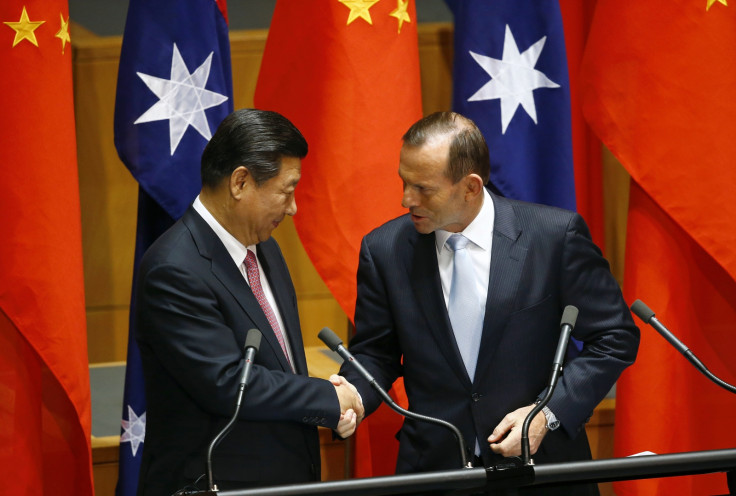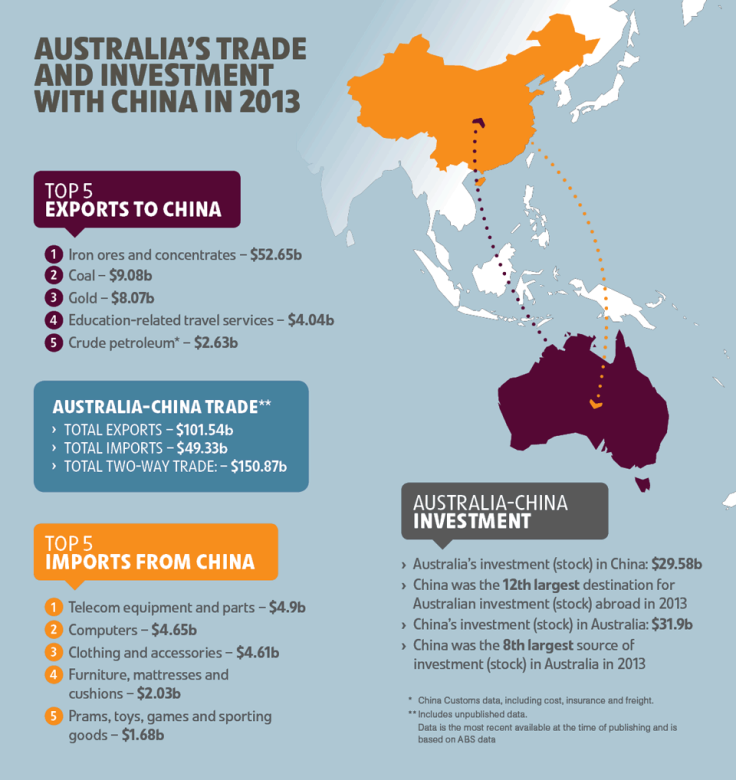Australia-China Free Trade Deal Prompts Fears Over Lowering Standards

Reaction to Australia and China's free trade deal, agreed in Canberra on 17 November, has been mixed.
The China-Australian Free Trade Agreement (ChAFTA) is expected to see huge wins for Australia's agriculture sector, with tariffs on goods such as dairy, beef and wine to be phased out over the coming years;.
For China, perhaps the biggest win is likely to come in the mining and extractive industries, with the deal giving it tariff free access to Australia's substantial energy and mineral reserves.
It means that Australia has completed free trade agreements with its three biggest Asian trading partners – China, Japan and South Korea, which combined, account for more than 50% of its exports base.
However, the Australian Labor Party has been vocal in its opposition to the deal's opacity and has said it will reserve judgement until it has seen and assessed all of the details.
Trade Spokesperson Penny Wong told ABC: "The government has refused to release the text to you, me and every other Australian to tell us the detail of what they've actually agreed, and in fact the text won't be released until after signing next year. But overall, what we say is, the principle of trade liberalisation is good for the economy, good for Australian jobs."
The draft document will now be translated and face a period of legal scrubbing, a process through which lawyers strip out anything that might result in a future lawsuit.
Mining groups have today voiced concerns that ChAFTA could lead to a reduction in standards if Chinese companies are permitted to bring their own workers to operate Australian mines. Under the terms of the agreement, Chinese companies will be allowed to bring in workers on three-month skilled visas.
Speaking to reporters at the Asia Pacific Resources Conference, the Chairman of the Australian Mining Association George Edwards said: "I know from having gone to China for nearly 40 years the standard in mines in China are not as high as they are here. I believe they are used to lower safety standards in general and therefore it makes it difficult for them to operate in an environment with higher standards."
His sentiments were echoed by the CEO of the Australasian Institute of Mining and Metallurgy Michael Catchpole, who told the Herald Sun newspaper: "As far as the FTA is concerned, we would want to ensure that if miners are brought in at a technical, operational or professional level that they have the required skills and training, and that they work within the same health and safety conditions that we expect in all Australian operations. Mining professionals in Australia are experiencing a level of unemployment that really we haven't seen in more than a decade."
Andrew Robb, the Australian Trade Minister, denied the deal would lead to a replacement of Australian jobs, saying: "It means that if there are no Australian labourers available – and it won't be labourers, it will be skilled workers - for a particular project, they will be able to apply to get an investment facilitation agreement."
Those involved in other sectors, however, have been more enthusiastic. The Director of China Strategy at the University of South Wales, Laurie Pearcey, wrote in an editorial that "the services sector is poised to reap significant gains" from the deal.
He wrote: "China has one of the most protectionist international education systems in the world and the sector was missing in action from most of the negotiations. This agreement will give Australian providers direct access to the largest source of full-fee-paying international students.
"It will provide a welcome boost to universities dependent on international student revenue to offset Commonwealth funding shortfalls. The agreement comes when universities face an uncertain domestic political environment and fee deregulation."
The deal highlights the focus Tony Abbott's Australian government has put on trade and exports. Australia is a participant in discussions over three large plurilateral deals: the Trans-Pacific Partnership (TPP), the Free Trade Area of the Asia Pacific (FTAAP) and the Regional Comprehensive Partnership (RCEP).
"Australia is in a unique position - as we pursuing all the competing trade deals, simultaneously. The Australian Prime Minister Tony Abbott was busy arguing for convergence and consolidation of the TPP, RCEP, and FTAAP today," Dr Matthew Rimmer of the Australian Research Council told IBTimes UK during the recent Asia-Pacific Economic Co-operation (Apec) Summit.
For China, it represents another step towards liberalising its economy. Oft-criticised for its protectionist policies, China has made significant progress towards bilateral trade deals with both Australia and South Korea in the past week, and has also made efforts to progress the wide-reaching FTAAP, while continuing to promote RCEP as the preferred stepping stone to FTAAP.

© Copyright IBTimes 2025. All rights reserved.






















